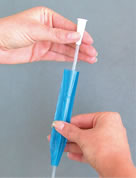 Guest post by Albert Medical Devices (now Melio Leg Bag) (AMD). AMD addresses incontinence and dementia and offers a dignified alternative for reducing accidents. English-language usage of this UK-based company left intact. (TCV Ed.)
Guest post by Albert Medical Devices (now Melio Leg Bag) (AMD). AMD addresses incontinence and dementia and offers a dignified alternative for reducing accidents. English-language usage of this UK-based company left intact. (TCV Ed.)
What Is Dementia?
Dementia describes a range of symptoms including memory loss, mood changes and communication problems. There are numerous diseases and conditions which result in dementia. These are:
Alzheimer’s disease: This is the most common cause of dementia. It is a progressive disease which causes the brain cells to die. The first signs of this disease are short term memory loss and impaired speech.
Vascular dementia: If oxygen supply to the brain fails due to vascular disease, brain cells can die causing symptoms such as a stroke.
Dementia with Lewy bodies: Tiny abnormal structures develop inside nerve cells and their presence in the brain leads to the degeneration of brain tissue. The symptoms include disorientation, hallucinations as well as problems with reasoning and planning. This form of dementia shares some characteristics with Parkinson’s disease.
According to the Bladder and Bowel Foundation, approximately 60-70% of people with dementia develop incontinence. Incontinence can be distressing and humiliating for an incontinence sufferer and upsetting for those around them. There are two different types of incontinence:
- Urinary Incontinence – loss of bladder control with unintentional passing of urine.
- Faecal Incontinence – Loss of bowel control with involuntary passing of stools.
Why incontinence occurs with dementia
As cognitive function declines, an individual may forget to go the toilet or forget where the toilet is. A person’s brain cells may be so damaged due to dementia; s/he may no longer recognise the need or feel an urge to go to the toilet. Additionally, incontinence can also occur as a side effect of medication.
Why is incontinence distressing for dementia sufferers?
Hygiene is personal to an individual. From a young age we are trained to control our toilet urges. Being incontinent makes us feel as though we have lost control–affecting our dignity and self-esteem. Likewise, loved ones with dementia who experience incontinence will need help with a sensitive and intimate area of their lives. Meanwhile, carers who do not yet fully understand incontinence and dementia may grow increasingly frustrated as accidents happen.
If you’re a carer the best way to help them overcome their embarrassment is with understanding and even humour. It’s important to avoid being angry or upset as it’s not the persons fault. However, this may not be as easy as it sounds. If as a carer you are finding it difficult to deal with it may be a good idea to speak to a community nurse or continence advisor.
How to Try and Reduce Accidents
- On the toilet door have a visual reminder as pictures are easier tools to identify an object.
- Remove all obstacles from the toilet door to create faster and easier access.
- Leave the toilet door open so it’s obvious where the toilet is.
- Change the colour of the toilet seat so as to make it more distinguishable. People with dementia often experience orientation difficulties.
- Make sure clothing is easier to remove – Velcro or drawstring trousers and skirts are great time savers.
- The carer should set scheduled toilet times and take them at regular intervals.
- Be aware of the signs that the person needs the toilet such as fidgeting, pulling clothing and pacing.
There are numerous aid options, including adult pads and diapers; yet, these may make a person with dementia feel a loss of dignity. Intermittent catheterisation may be useful as they do not remain in the body and are less likely to result in urinary tract infections. If accidents occur during the night, waterproof bedding and absorbent under sheets will help to keep the bed surface dry and prevent the skin becoming sore. Check with the nurse to determine which approach is most suitable.
![]() Look at the melio leg bag (was Albert Medical Devices) – a discreet incontinence aid which helps maintain dignity with a warning when the bag needs draining.
Look at the melio leg bag (was Albert Medical Devices) – a discreet incontinence aid which helps maintain dignity with a warning when the bag needs draining.








